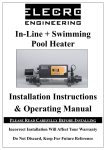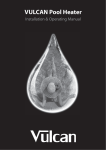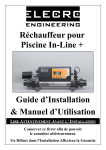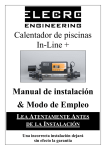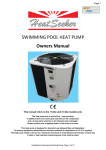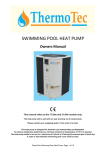Download Elecro Engineering In-Line + Swimming Pool Heater Troubleshooting guide
Transcript
Swimming Pool Heat Pump Owner’s Installation & Operations Manual 5005001B Version 2.02 Page 2 TABLE OF CONTENTS Introduction 3 Installation 5 Location 5 Wind Tie Down 5 Water Plumbing 6 Electrical Hook Up 6 Bonding 7 Water Chemistry Maintenance 8 Heat Pump Features 9 Heat Pump Operation 10 Control On/Off 10 Pool/Spa Modes 10 Changing Set Point Temperature 11 Heater Running Time 11 Keypad Lockout 11 Defrost Cycle 11 Condensate Draining 11 Care & Maintenance 12 Cleaning 12 Winterising 12 Troubleshooting 13 Service 15 Page 3 INTRODUCTION Congratulations on purchasing the most advanced high efficiency, microprocessor-controlled pool and spa heat pump available. Your heater has been manufactured with the most state-of-the-art quality control equipment available today to ensure the highest quality product delivered to your door. A heat pump pool heater is a highly efficient, cost effective method of pool heating. Proper operation and care will result in many years of swimming enjoyment and pleasure. Your new pool heater is a self-contained unit designed specifically for swimming pool and spa heating. It utilizes the sun’s free energy by extracting heat from the sun-warmed air and transferring it efficiently to the pool water. Because your pool heater moves the free heat from the outside air to the pool, rather than create heat, as a fossil fuel or electric resistance heater does, it can heat your swimming pool or spa for up to 80% less cost than these other less efficient methods. As with all pool heating methods, you are advised to utilize a pool cover at night and when the pool is not in use. The pool cover should be used if the night temperature is 15°F (8°C) less than the desired pool temperature. This will keep evaporation, the greatest source of heat loss, to a minimum, greatly reducing the overall pool heating costs. During warmer weather, the pool cover may not be required. Your pool and spa heater combines simplicity with trouble-free performance. As with most appliances, an understanding of proper operation of the heater is important. Proper installation and operation increases efficiency and reduces heating costs. Your pool heater is designed with features that make it simple to operate, maintain and service. Proper installation enhances these features and minimizes problems. This manual will provide you with the information needed to properly install, operate and maintain your heater. Page 4 Please be sure to complete and mail in the Warranty Registration Card that is provided in the package with your heater. This card helps us to notify you about new information on your heater. Also, please take a moment and jot down the following information. If you should ever need to call us for service or a question, we will need this information: Model Number:___________________________________ Serial Number:___________________________________ Purchase Date:___________________________________ Dealer Name/Address/Phone #:_______________________ __________________________________________________ Page 5 INSTALLATION LOCATION The unit is designed for outdoor installation and shall not be placed in a totally enclosed area such as a shed or a garage unless ventilation is provided to ensure adequate air exchange for proper operation. Recirculation of cold discharge air back into the evaporator coil will greatly reduce heating capacity and efficiency of the unit and void the compressor warranty. The heater should be located as close as practical to the existing pool pump and filter to minimize water piping length. The use of 90° bends and short radius elbows in the water piping should be limited to keep water pressure drop to a minimum. Your heater features an up-flow fan for quiet operation. Air is pulled through the evaporator coil and discharged through the top grill. At least 4 feet clearance should be allowed above the unit for unrestricted air discharge. The unit must not be installed under a porch. Any side of the unit should be located at least 12 inches from a wall or other obstruction for unrestricted air intake and service access. Mount the unit on a flat, level surface, preferably a concrete or fabricated slab. The unit should be completely isolated from the building foundation or wall to prevent the possibility of sound or vibration transmission into the building. The base of the unit may be used to fasten to if local codes require securing the unit to the slab. Make sure that there are no sprinkler heads near or directly spraying into the heater. Cap off or redirect heads as needed. WIND TIE DOWNS The unit can be strapped down using a strap kit. Attach a strap to each side and anchor to the deck. Page 6 WATER PLUMBING The piping sequence: pool pump / filter / heater / Chlorinator / Pool. In-line chlorinators must be down stream of the heater to minimize harm to the pool equipment. Rigid PVC piping is recommended and all joints should be secured with PVC glue. Make sure that the direction of the water flow through the heater is correct as indicated by the labels on the unit. When the piping installation is complete, operate the pool pump and check the system for leaks. Check the filter pressure gauge to ensure that excessive pump head pressure is not indicated. The recommended flow rate is 50 gpm through the heater. For questions on multiple heater installations, please contact our engineering department. Multiple unit installations should always be in parallel circuits. ELECTRICAL HOOK UP CAUTION: The main power disconnect must be off before opening the access panel. It is recommended that the wiring of your heater be done by a qualified electrician in accordance with local code requirements. IMPORTANT: The electrical conduit must be run up through the base of the unit and connected at the control box with a conduit connector. A properly sized breaker and copper wire must be used. See inside access panel for wiring diagram. Page 7 BONDING Because all metals have different electrical potentials, ALL metal and electrical components of the pool system must be bonded together. This includes the metal framework of the pool, lights, pump, filter, heater, any automatic chlorine generator and any other metal or electrical equipment. On some older pools, this substructure bond wire may not exist. In this case, a 6 to 8 ft. copper rod must be driven into the ground near the pool equipment and all electrical and metal components must be bonded to the rod. A bonding lug is furnished on the side of the control box of the heater for the bond wire to be attached. Warranty will be void if system is not properly bonded. Control Box Approved Connector To Main Power Flexible Conduit Attach Bond Wire From Pool Pump Here Page 8 WATER CHEMISTRY MAINTENANCE Not only is the water chemistry of your pool or spa important to the health of you and your family, it also directly affects the life of your heater. This is the most important item in the maintenance of the heater. If the water chemistry is improperly maintained or if the chemicals are improperly introduced into the water, this will damage the heater’s internal heat exchanger and could eventually cause a leak, rendering the heater inoperable. CAUTION: Damage to the heater due to improper water chemistry is not covered under the warranty.* Following is the table for essential water quality readings, which must be constantly maintained: Description Normal Range Verify PH Level 7.4 to 7.8 1 time per week Chlorine Concentration 1.0 to 3 PPM 1 time every 2 to 3 days Total Alkalinity 80 to 120 PPM 1 time every 2 to 3 weeks Total Dissolved Solids Below 2400 PPM 1 time per month Calcium Hardness 200 to 300 PPM 1 time per month The location of the chemicals’ introduction to your system is also critical to the heater’s life. If an automatic in-line chlorinator or brominator is used, it must be located downstream of the heater. A trap must also be installed between the chlorinator and the heater to prevent chlorine return into the heater. IMPORTANT: Never leave any type of solid chlorine in the pool skimmer. This will cause a high concentration of Chlorine to enter the heater, causing premature corrosion. You must divert water flow directly to the pool before adding fast dissolving chemicals in skimmer. * Models with Titanium Tube heat exchangers do not have a water chemistry exclusion in their warranty. Page 9 HEAT PUMP FEATURES CABINET – Your heat pump’s cabinet is made from a maintenance-free, rust-free plastic that is UV resistant. It will last for years and any dirt or dust may simply be wiped away with a cloth or sprayed off with a water hose. The use of a product such as Armor- All will restore its natural luster. DO NOT USE CLEANERS THAT CONTAIN ALCOHOL. CONTROL – State-of-the-art LCD readout control. Displays mode and temperature of the water for ease of operation. No programming to learn. Dual thermostats allow user to set pool and spa temperatures. The control is self-diagnostic and will display a fault if there is a problem. Other features include: lockout, spa timer, automatic low temperature defrost and remote control capabilities. ULTRA-QUIET – The unit is equipped with a low RPM fan motor in combination with a deep drawn venturi to ensure whisper quiet operation. HIGH EFFICIENCY – The heat pump utilizes the latest in compressor technology to produce the highest efficiency available when coupled with the over-sized enhanced fin evaporator coil. EASE OF INSTALLATION - The unit is equipped with easy-to-install, hand-tightened unions for a quick and trouble-free installation. The unions will accept 2” PVC piping. The electrical connection is made with one entry directly into the control box for a quick hook-up and a neat appearance. EASY ACCESS – The heater was designed for quick and easy access for installation and diagnosis. The service panel is removed with two screws and access to all service connections is right up front and easy to reach. This allows the installation and service to be done quickly and efficiently – so valuable time is not wasted. Page 10 HEAT PUMP OPERATION CONTROL ON/OFF When the unit is powered up, but in the OFF mode, the display will show “OFF”. To turn the unit on, press the Up arrow button until desired temperature is reached. To turn the unit off press and hold the Down arrow button until the display shows off. This point will be one level below 50 degrees. This is convenient for shutting the unit down for short periods of time. CAUTION: When the control is in the “OFF” mode, there is still high voltage to the unit. If you want to turn the unit off for long periods of time, shut the main power off to the unit at the main or service disconnect. POOL/SPA MODES The control is equipped with two independent thermostats, one for pool temperature and one for spa temperature. This is to allow the user to preset a temperature of their choice and switch between the two settings with the POOL/SPA button located on the control. When power is applied to the control it will turn on in the previous mode, whether it is Pool Heat or Spa Heat. When water is flowing through the unit and the water temperature meets the specified set point condition, the control will initiate a heat cycle. If you do not have a spa, you can use the spa thermostat as a second temperature setting if you do not want to maintain full temperature all the time. For instance, if you swim on the weekends only, you can set the temperature back during the week to save costs but maintain a warmer temperature for a shorter recovery time for the weekend. ATTENTION: There is a 5-minute time delay upon completion of a heating cycle. This is to ensure that the critical components do not fail due to short cycling of the heater. The display on the control will show the thermostat being used and the operating mode on the top line and the current water temperature on the bottom line. The possible mode displays are: “POOL – HEAT”, “SPA – HEAT”. Page 11 CHANGING SET POINT TEMPERATURE To change the set point temperature, press either the Up or Down arrow buttons on the control. The display will then show “POOL TEMPERATURE” on the top line and the current set point temperature in numbers on the bottom line. After adjusting to the desired temperature setting, the display will revert to “POOL – HEAT” (or whichever mode you are in) on the top line and the pool temperature in numbers with “DEGREES” on the bottom line after 5 seconds of inactivity and the new set point will be stored in memory. The default factory setting for Pool temperature is 85 degrees Fahrenheit. HEATER RUNNING TIME The owner is responsible for determining the necessary length of operating time for the pump and heater based upon their particular requirements. Most units are sized to operate during the pool filtering cycle time of 8 to 12 hours daily, providing an even, steady flow of heat. On warmer days the heater will run less because there will be less heat loss from your pool. The heater is capable of running 24 hours per day if necessary. When you first run your heater, it may need to run continuously for 24 to 48 hours to get the pool up to the desired temperature. KEYPAD LOCKOUT While in any mode the user can lockout the keypad by pressing and holding the POOL/SPA button for 6 seconds. When the keypad lockout has been enabled all buttons are disabled and the control will operate in whatever mode it was in when the lockout occurred. Any button push while in lockout will cause the display to show LOCKOUT for 5 seconds. To unlock the Keypad, press and hold the POOL/SPA button for 6 seconds. The display will show UNLOCKED for 5 seconds. DEFROST CYCLE The heater is designed to enter the defrost cycle at ambient air temperatures below 48° Fahrenheit. During this cycle, the unit may shut down and the control will display “Defrosting” until the ambient air temperature rises above frosting conditions. CONDENSATE DRAINAGE It is normal for water to be draining from your heater. This occurs because the evaporator coil condenses the water from the air. The water drains into the base of the unit and out the holes that are located on each side of the heater at the bottom. Your heater can produce 1 to 3 gallons of water per hour. The water created from the condensation will dry up when the heater shuts off. Page 12 CARE & MAINTENANCE CLEANING There is not much maintenance that needs to be done on your heater. Making sure there is good airflow through the evaporator and proper drainage are the two main tasks. A garden hose with low-pressure water flow can be used to clean the evaporator coil. Keep all shrubs trimmed back away from the unit to allow sufficient airflow. CAUTION: Make sure all power is disconnected to the heater prior to washing. Clean the coil as needed. If located near the ocean, cleaning will need to be done regularly to remove salt and sand. Use a very soft brush so as not to bend the coil fins with soapy water to remove any build up. Keep the drain holes in the base free of debris to assure proper condensate drainage. Your heat pump’s cabinet is made from a maintenance-free, rust-free plastic that is UV resistant. It will last for years and any dirt or dust may simply be wiped away with a cloth or sprayed off with a water hose. The use of a product such as Armor- All will restore its natural luster. DO NOT USE CLEANERS THAT CONTAIN ALCOHOL. Alcohol based cleaners may damage the plastic. WINTERISING In areas where freezing condition is not prevalent and winterizing of pools is not common, allow water to flow through the heater even when not in use. In freezing areas, it is mandatory that the water be completely drained from the heater and disconnected from the piping. The heat exchanger must be blown out with air to ensure no water in the heat exchanger. Page 13 TROUBLESHOOTING A simple test to verify that your heater is functioning is to place your hand above the unit. There should be cool air blowing out the top after time delay has expired. The return water to the pool should be a few degrees warmer than water entering the heater. After about 15 minutes of run time, there should be water draining out of the base of the unit. If you have reason to believe your heater is not functioning properly, follow the troubleshooting guide below or call the factory for service. CONDITION Control Display Blank Control Displays "LOW FLOW" Control Displays "DEFROSTING" Control Displays "LOW REFRIGERANT PRESSURE" POSSIBLE CAUSE No power supply to heater. Tripped breaker or blown fuse. Control failure. The pool pump is not on. A valve is turned, bypassing the water through the heater. Clogged water line, filter or pump impeller. Internal water pressure switch failure. Ambient air is too low for heater to function. Refrigerant leak. POSSIBLE SOLUTION Reset breaker. Replace fuse. If problem persists, call factory for service. Turn pool pump on. Clean pump and filter. Adjust water valves. If problem persists, call factory for service. Unit will turn back on once ambient air rises to appropriate level. Call factory for service. Page 14 Control Displays "HIGH REFRIGERANT PRESSURE" Control Displays "HP3 Water Lockout” Control Displays "HIGH WATER TEMPERATURE" Control Displays "EVAP SENSOR MALFUNCTION" Control Displays "WATER SENSOR MALFUNCTION" Pool is heating slowly or not getting up to temperature. Water flow restriction, valve is turned restricting flow. Water flow restriction, valve is turned restricting flow. Clean pump and filter. Adjust water valves. If problem persists, call factory for service. Clean pump and filter. Adjust water valves. If problem persists, call factory for service. Call factory for service. Heater control malfunction. Secondary source of heat. Defrost sensor Call factory for service. malfunction or not connected. Water sensor Call factory for service. malfunction or not connected. Low or restricted water Clean or replace filter. flow through the Inspect and clean pool heater. Leak in pump. Adjust water valves. plumbing allowing air Repair air leaks. Use a pool into the water flow. It is cover. Construct a wind cold outside. Pump break around pool. Set pool timer is not set for a pump timer longer. Call long enough run time. factory for service. Pool is not being covered. High wind speed over pool. Pool area shaded. Water is running The heater produces up Shut the heater off for out of the bottom to 3 gallons per hour of several hours and leave the of the heater. water condensing from pool pump running. If the the evaporator coil. water is still running out, Internal water leak. call factory for service. Page 15 SERVICE All service must be handled by an Authorised Service Center. Warranty may be void if a non-authorized service representative does service. Do not return the heater to your dealer, as they do not provide service. Before calling for assistance or service, please check the Troubleshooting section of this manual or call your dealer. This may save you the cost of a service call. If you still need help, follow the instructions below. Service can be obtained by calling Elecro Engineering Ltd: 01438 749474 When asking for help or service please provide a detailed description of the problem, your heater’s complete model number and serial number, the purchase date and dealer purchased from. This information will help us respond properly to your request. Keep a copy of the sales receipt showing the date of purchase. Proof of purchase will assure you of in-warranty service. Elecro Engineering Ltd. Unit 14 Leyden Road Stevenage Hertfordshire SG1 2BW Tel: (01438) 749474 Fax (01438) 361329 www.elecro.co.uk
















